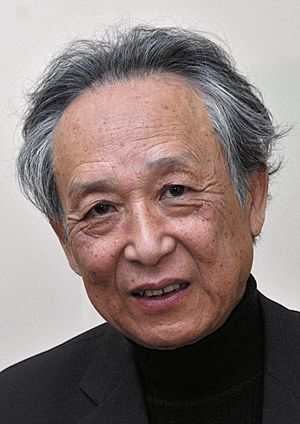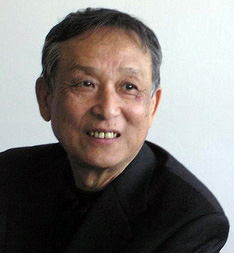Gao Xingjian facts for kids
Quick facts for kids
Gao Xingjian
|
|||||||||||
|---|---|---|---|---|---|---|---|---|---|---|---|

Gao in 2012
|
|||||||||||
| Born | January 4, 1940 Ganzhou, Jiangxi, China |
||||||||||
| Occupation |
|
||||||||||
| Language | Chinese | ||||||||||
| Citizenship | |||||||||||
| Alma mater | Beijing Foreign Studies University | ||||||||||
| Genre | Meta-theatre, genre resistant | ||||||||||
| Notable works | Absolute Signal (1982) The Bus Stop (1983) Wild Man (1985) The Other Shore (1986) Soul Mountain (1990) |
||||||||||
| Notable awards | Nobel Prize in Literature (2000) |
||||||||||
| Spouse | Wang Xuejun (王学筠); divorced | ||||||||||
| Chinese name | |||||||||||
| Chinese | 高行健 | ||||||||||
|
|||||||||||
Gao Xingjian (Chinese: 高行健; born January 4, 1940) is a famous Chinese-born writer, artist, and director. He later became a French citizen. In 2000, he won the Nobel Prize in Literature. He received this award for his amazing writing, which showed deep understanding and clever use of language. Gao is also a skilled translator, especially of plays by Samuel Beckett and Eugène Ionesco. He has worked as a screenwriter, a stage director, and is a well-known painter.
Gao's plays are often seen as "absurdist," meaning they explore strange or illogical situations to make a point. They were also considered very new and experimental in China. His play Absolute Signal (1982) was a big step forward for experimental theater in China. Other plays like The Bus Stop (1983) and The Other Shore (1986) had their performances stopped by the Chinese government. Wild Man (1985) was the last of his works to be shown publicly in China. He left China in 1987. After that, his plays, starting with The Other Shore, began to focus on ideas that were important to everyone, not just people in China. In 1997, he became a French citizen.
Gao's work is inspired by traditional Chinese opera, folk stories, and European plays from the 20th century. He once said that his writing combines ideas from both Western and Eastern cultures. He is a very private person and believes in being independent. He has stated, "No matter whether it is in politics or literature, I do not believe in or belong to any party or school." His novels are not as widely celebrated in China but are highly praised in Europe and other Western countries. His novel Soul Mountain was specifically mentioned when he won the Nobel Prize.
Contents
Early Life and Education
Gao Xingjian was born in Ganzhou, Jiangxi, China, in 1940 during a time of war. After World War II, his family moved to Nanjing. He has been a French citizen since 1997. In 1992, the French government honored him with the Ordre des Arts et des Lettres award.
Childhood in China
Gao's father worked at the Bank of China, and his mother was part of the YMCA. His mother was also an actress in plays that spoke out against the Japanese during the Second Sino-Japanese War. Because of his mother's influence, Gao loved painting, writing, and theater from a young age. As a middle school student, he read many translated books from Western countries. He also learned to draw, paint with ink, use oil paints, and sculpt with clay. His art teacher was Yun Zongying.
In 1950, his family moved to Nanjing. In 1952, Gao attended the Nanjing Number 10 Middle School. This school was connected to Nanjing University.
University Years and Early Career
Gao finished middle school in 1957. His mother advised him to choose Beijing Foreign Studies University (BFSU) instead of an art school, even though he was very talented in art.
In 1962, Gao graduated from BFSU, where he studied French. After graduating, he worked for the Chinese International Bookstore. In the 1970s, during a period called the Down to the Countryside Movement, he faced difficulties as a public intellectual. He was forced to destroy his early writings and sent to the countryside in Anhui Province to do hard labor for six years. For a short time, he taught Chinese at Gangkou Middle School. In 1975, he was allowed to return to Beijing. He then became the head of the French translation team for the magazine China Reconstructs.
In 1977, Gao started working for the Committee of Foreign Relationship, Chinese Association of Writers. In May 1979, he visited Paris with other Chinese writers, including Ba Jin. In 1980, Gao became a writer for plays and screenplays at the Beijing People's Art Theatre.
Creative Works and Exile
Gao is known for bringing "absurdist" drama to China. His plays Signal Alarm (1982) and Bus Stop (1983) were performed while he worked at the Beijing People's Art Theatre from 1981 to 1987. These plays were influenced by European theater and made him known as an experimental writer. Absolute Signal was seen as a groundbreaking work in Chinese experimental theater. His plays Wild Man (1985) and The Other Shore (1986) openly questioned government policies. The rehearsals for The Other Shore were stopped after only one month.
In 1986, doctors mistakenly told Gao he had lung cancer. This led him to take a 10-month journey along the Yangtze River. This trip inspired his famous novel Soul Mountain (《靈山》). This book, which is part memoir and part novel, was first published in Taipei in 1990. It mixes different writing styles and uses changing voices to tell the story. The Nobel Prize committee praised it as a unique literary work. The book describes his travels from Sichuan province to the coast and his experiences living among Chinese minority groups.
Life in Europe
By the late 1980s, Gao had moved to Bagnolet, a town near Paris, France. His 1989 play Fugitives (also called Exile) was about three people hiding after the events of June 4, 1989. Because of this play, all his works were banned in China, and he was officially not allowed back in the country.
Selected Works
Here are some of Gao Xingjian's important works:
Plays and Performances
- 《絕對信號》 (Signal Alarm / Absolute Signal, 1982)
- 《車站》 (Bus Stop, 1983)
- 《野人》 (Wild Men / Wilderness Man, 1985)
- 《彼岸》 (The Other Shore, 1986)
- 《逃亡》 (Fugitives / Exile, 1989)
- 《生死界》 (Death Sector / Between Life and Death)
- 《山海經傳》 (A Tale of Shan Hai Jing)
- 《八月雪》 (Snow in August)
Novels and Short Stories
- 《寒夜的星辰》 ("Constellation in a Cold Night", 1979)
- 《有隻鴿子叫紅唇兒》 ("Such a Pigeon called Red Lips", 1984) – a collection of short novels
- 《給我老爺買魚竿》 (Buying a Fishing Rod for My Grandfather, 1986–1990) – a collection of short stories
- 《靈山》 (Soul Mountain, 1989)
- 《一個人的聖經》 (One Man's Bible, 1999)
Poetry
During the 1970s, when he was forced to work as a peasant, Gao Xingjian wrote many plays, stories, and poems. He had to burn them to avoid trouble because his writings were seen as against the government. He hasn't published collections of poetry since then, but one short poem, "Sky Burial," is known.
Other Writings
- 《現代小說技巧初探》 ("A Preliminary Examination of Modern Fictional Techniques", 1981)
- 《沒有主義》 (Without -isms)
Paintings
Gao Xingjian is also a painter, especially known for his ink and wash painting. His art has been shown in many exhibitions around the world.
Gao Xingjian Center at National Taiwan Normal University
Gao Xingjian has a strong connection with National Taiwan Normal University (NTNU) in Taiwan. In 2008, he became an honorary professor there. In 2012, he became a chair professor at the Graduate Institute of Performing Arts, where he has taught courses. In 2017, NTNU gave him an honorary doctorate degree for his great achievements.
Since 2012, NTNU has worked closely with Professor Gao on many events. For example, in 2012, they held "Encounter Gao Xingjian at NTNU." In 2014, NTNU and the National Palace Museum showed his cinematic poem "Requiem for Beauty." Professor Gao also gave the university Xingjian Hall, a rehearsal room. Later, in 2017, they held the "Gao Xingjian Art Festival," where his painting "The Thinker" was shown. In 2019, "Gao Xingjian Week" introduced courses about his literature and plays. The university's performing arts students have also performed many of his plays, including "Nocturnal Wanderer" (2012) and "Soul Mountain" (2016, 2017).
In 2020, Professor Gao celebrated 10 years as an NTNU chair professor. He generously donated many of his original writings and books to the university. To support research on his works, NTNU opened the Gao Xingjian Center in its library. This center keeps his writings and research materials. NTNU hopes to become a main place for studying Gao Xingjian's works in the Chinese-speaking world.
Personal Life
Gao Xingjian is an atheist, meaning he does not believe in a god or gods.
See also
 In Spanish: Gao Xingjian para niños
In Spanish: Gao Xingjian para niños
- Chinese literature
- List of Nobel laureates in Literature
- List of Chinese writers
 | Frances Mary Albrier |
 | Whitney Young |
 | Muhammad Ali |


